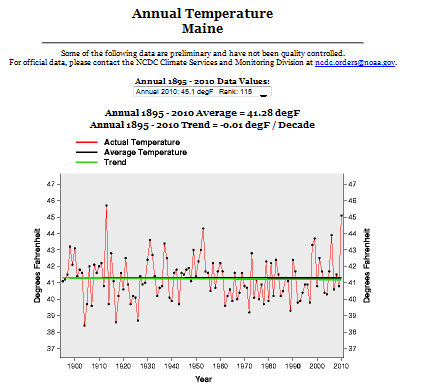More than a year in the planning, the Signs of the Seasons: A Maine Phenology Project is looking for people to track seasonal changes in 13 indicator species, from seaweed to the American robin. The results will help scientists understand what climate changes are happening in Maine and their impact on wildlife.
Stancioff said the survival of animals and plants in Maine hinges on predictable seasonal changes, such as migrating birds that depend on the emergence of the insects they feed on by the time they arrive in Maine.
They must have very sensitive critters in Maine, where temperatures haven’t changed for at least 120 years.



Here I thought they were talking about Phrenology:
http://www.cerebromente.org.br/n01/frenolog/frenologia.htm
The science that Climatology is structured after.
The science of bumps on the head is better established than the study of CO2 concentrations and how they are related to weather.
I believe both are equally valid.
and all throughout history…
…those things were predictable
Steve, take a look at these two bombshells
New peer reviewed research indicates that sea level rise is not accelerating and possiblly decelerating. [100 year of analysis]
http://wattsupwiththat.com/2011/03/28/bombshell-conclusion-new-peer-reviewed-analysis-worldwide-temperature-increase-has-not-produced-acceleration-of-global-sea-level-over-the-past-100-years/
Dr. David Evans is a former carbon modeler for the Australian Government. Up to 2010 he did work for them.
http://joannenova.com.au/2011/03/david-evans-carbon-modeler-says-its-a-scam/
Another study of non-results from a non-event. The very definition of busywork!
I guess the “American Robin” I’ve been seeing for the past 47 years, without fail in early March, is some type of hybrid that can withstand extreme global, earth has a fever temperatures-they all look the same to my uneducated eye.
Am I an idiot (a distinct possibility), or do all of these climate sensitivity studies ignore the fact that all species endure extreme temperatures every summer and winter? And if an increase in temperature happens in the winter, it results in less stress and death? And an increase in average summer temperature can be either an increase in the number of hot days and/or an increase in the high temperature? I do not see how all of this is accounted for, it flunks the common sense test.
No, you’re asking the right question. And you’re making the right assessment. It does “flunk the common sense test.”
No way can the plants in Maine survive rapid warming like it did around 1915!